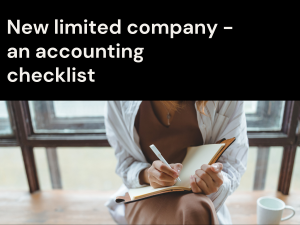For every business owner, there comes a time when they may wish to sell their business.
This could be because they are retiring, relocating, or simply looking to exit the business they have built up. Whatever the reason, if you are thinking about disposing of a business, you may be able to claim Business Asset Disposal Relief (BADR).
In this quick guide, we’ll walk you through what BADR is, how you can claim it, and what assets qualify. Hopefully by the end, you’ll have a better idea of whether or not this tax relief is right for your business.
What is Business Asset Disposal Relief (BADR)?
Known as Entrepreneurs’ Relief until 6 April 2020, Business Asset Disposal Relief (BADR) is the process of selling (or ‘disposing of’) all or part of your business to benefit from reduced Capital Gains Tax rates.
BADR means you’ll pay tax at 10% on all gains on qualifying assets. This tax relief allows small business owners to make the most of qualifying business assets when they sell up, whether that’s a minority share in the business or all of it.
By claiming BADR, you could potentially save a lot of money on Capital Gains Tax. However, there are certain criteria you must meet in order to qualify, which we’ll take a look at next.
Business Asset Disposal Relief Eligibility Criteria
There are some key requirements that you may need, to be eligible for, BADR, including:
- If you want to sell all or part of your business
- If you want to sell shares or securities in your business
GOV.UK outlines clear eligibility criteria for each of these requirements, which we have collated below for your reference.
If you want to sell all or part of your business:
To qualify for BADR by selling all or part of your business, eigibility criteria includes:
- Being a sole trader or business partner for at least 2 years
- Having owned the business for at least 2 years
If you’re closing your business instead, the same conditions apply. However, sole traders must dispose of your business assets within 3 years to qualify. So if you’re wanting to claim relief on your sole trade, you’ll need to meet these criteria.
If you’re selling shares or business securities
To qualify for relief by selling shares or securities in your business, eligibility criteria includes:
- Being an employee or office holder of the company or another group company for at least 2 years
- Your company is a trading company (rather than a company that handles non-trading activities like an investment organisation) – or it’s the holding company of a trading group.
EMI & Share eligibility rules
There are further rules depending on whether or not the shares are from an Enterprise Management Incentive (EMI).
If the shares or options are from an EMI, qualifying capital gains relief criteria includes:
- The options must have been granted after 5 April 2012
- You must have been given the option at least 2 years before selling them
If the shares are not from an EMI, eligibility criteria includes:
- The business must be a ‘personal trading company’ for at least 2 years before you sell your shares
- You must hold at least 5% of both the shares and voting share capital
- You must be entitled to at least 5% of either profits that are available for distribution and assets on winding up the company or disposal proceeds if the company is sold.
How To Work Out Your Tax Relief For BADR
If all your gains qualify for Business Asset Disposal Relief, you can work out your tax relief in a few key steps:
- Work out the gain for all qualifying assets.
- Add the gains together (and deduct qualifying losses) to work out the total taxable gain eligible for BADR.
- Deduct your tax-free allowance.
- You pay 10% tax on what’s left.
If you aren’t sure how to calculate your gain for qualifying assets, or are just overwhelmed at the sight of these steps, you can employ expert tax services to support you. This can be the best way to make sure you get the most out of your BADR tax relief and avoid any mistakes.
Applying For BADR
There are a couple of options when it comes to applying for this relief. You can claim BADR by:
- Filling in Section A of the Business Asset Disposal Relief Helpsheet
- Adding it to your self-assessment tax return
It’s also important to note that there is a £1 million lifetime limit to BADR, however there is no limit to how many times you can claim meaning you could have four gains of £250k which would all be eligible and fully utilise your lifetime limit.
You can contact HMRC or a small business tax professional to find out more about this.
Deadline for applying for relief
Tax year that you sold or closed your business | Deadline to claim Business Asset Disposal Relief |
2020 to 2021 | 31 January 2023 |
2021 to 2022 | 31 January 2024 |
2022 to 2023 | 31 January 2025 |
2023 to 2024 | 31 January 2026 |
Business Asset Disposal Relief (BADR) FAQs
How does Business Asset Disposal Relief work?
BADR works by allowing taxpayers to lower their capital gains tax on the sale of certain business assets. By disposing of certain business assets, taxpayers can pay tax at 10% on their capital gains.
What is the limit for Business Asset Disposal Relief?
The lifetime limit for BADR is £1 million, however it’s important to remember that there is no limit on the number of times you can claim this relief. If you’re a small business owner, this could be a great tool for you to minimise your tax spend.
How do I claim Business Asset Disposal Relief on my tax return?
You can claim BADR by adding it to your self-assessment tax return or by filling in Section A of the Business Asset Disposal Relief Helpsheet. If you need support claiming BADR through your tax return, contact us today for a no-obligation chat.
How do you qualify for BADR?
To qualify for BADR, there are a number of eligibility steps to go through. This includes things like ensuring that you’ve owned the business assets for a certain period of time, and that you meet the minimum percentage requirements for share ownership. You can find full details on how to qualify for BADR in our guide above.
Looking For Expert Support With Your BADR Claim?
At Raw Accounting, we are happy to help you with any questions you have about Business Asset Disposal Relief or any other tax-related queries.
We specialise in small business tax and accounting, with services crafted to support you throughout the tax year. Our experts can help with:
- Preparing and filing your self-assessment tax return
- Calculating your taxable gain for BADR purposes
- Bookkeeping and accounting
- Optimising your tax position
- Advising on how to structure your shareholdings for maximum benefit.
For a free, no-obligation chat about how we can help you claim BADR and reduce your tax bill, get in touch today.






